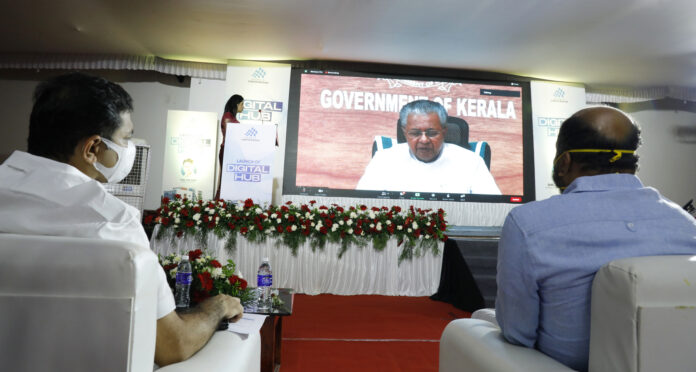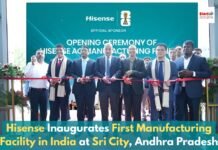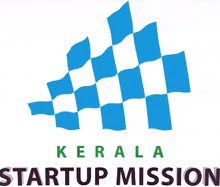
Kochi | 18th September 2021: Kerala is working towards a four-fold increase in the number of startups by aiming to take their total to 15,000 in the next five years, Chief Minister Shri Pinarayi Vijayan said today.
To realise the plan, the government will set up technology labs and incubators that will play a critical role for nascent firms to transform the state into a knowledge society, he said after inaugurating a pioneering digital hub by the Kerala Startup Mission (KSUM) at Kalamassery, 15 km north of this city.
Since internet connectivity is crucial for the growth of startups, authorities have already come up with complementary projects such as K-Fon. The government will continue to ensure equitable distribution of resources while building an innovation ecosystem, the Chief Minister pointed out at the function marking the opening of the KSUM’s facility that aims to host a vibrant ecosystem comprising incubators, accelerators and Centres of Excellence in emerging technologies.
“The work space totalled two lakh square feet in 2019 when KSUM opened Technology Innovation Zone (TIZ). Today, the Digital Hub has helped double that space,” Shri Vijayan said, pointing out that KSUM provides interest-free loans to startups. Venture funding with a corpus of Rs 750 crore will be made available. Besides venture capital worth Rs 250 crores are anticipated from financial institutions such as Kerala Bank, KSIDC, KFC and KSFE.
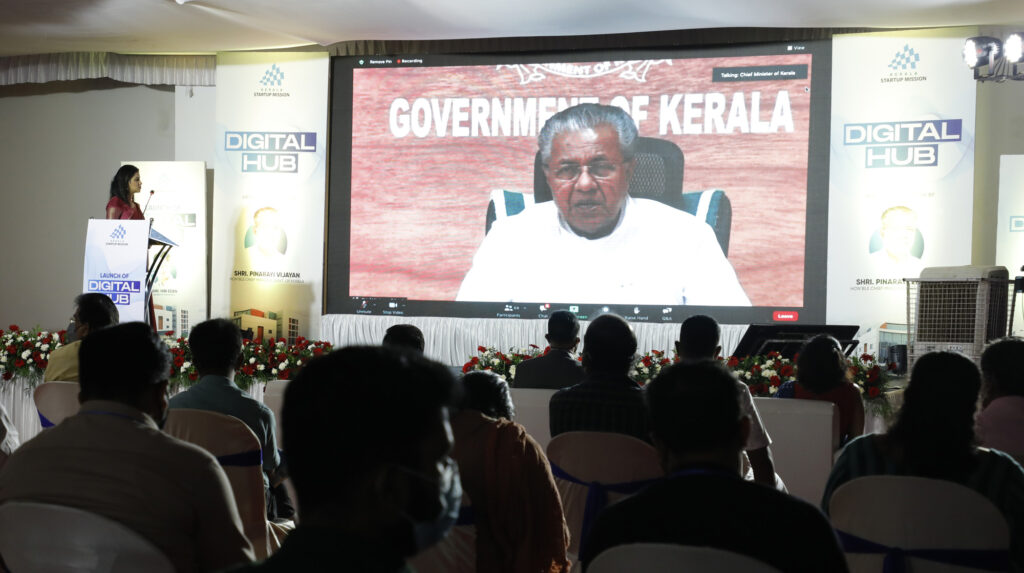
In his virtual address at the event amid the physical presence of Cabinet colleague Shri P Rajeeve, among others, Shri Vijayan stressed the “growing importance” of knowledge, innovation and creativity in a world where best ideas win in the market. “We are particular that shortage of funds should not stand in the way of conversion of a brilliant innovative idea into marketing reality,” he noted, referring to Digital Hub’s prospective emergence as one of South Asia’s largest product development centers for technology startups.
As Kerala’s startups will be linked internationally in a big way, KSUM will find its place on the global technological map. “We will organize programmes such as ‘Innovation Challenge’ for the youths to prove their competence. The winners will get government assistance to market their product,” the Chief Minister said.
The state capital of Thiruvananthapuram is envisaged to become a hub of AI (artificial intelligence). “The Covid-19 times have shown us the vitality of data collection, distribution and analysis. Considering this, the government is looking at the scope for strengthening the data parks,” Shri Vijayan added, stressing the need for lesser dependence on foreign countries for software and hardware.
Tailor-made to this vision, the state-of-the-art Digital Hub at Technology Innovation Zone (TIZ) occupies 2 lakh square feet of built-up space with a capacity to support 200 startups, besides the 165 startups hosted in the adjoining Integrated Startup Complex of KSUM. Housing a design incubator, healthcare incubator, CoE (Center of Excellence) for Mouser Electronics, co-working spaces, design studios, investors hive and an innovation center, the hub is envisaged to be a destination for designing and prototyping, opening for international organisations and institutions to build world-class products.
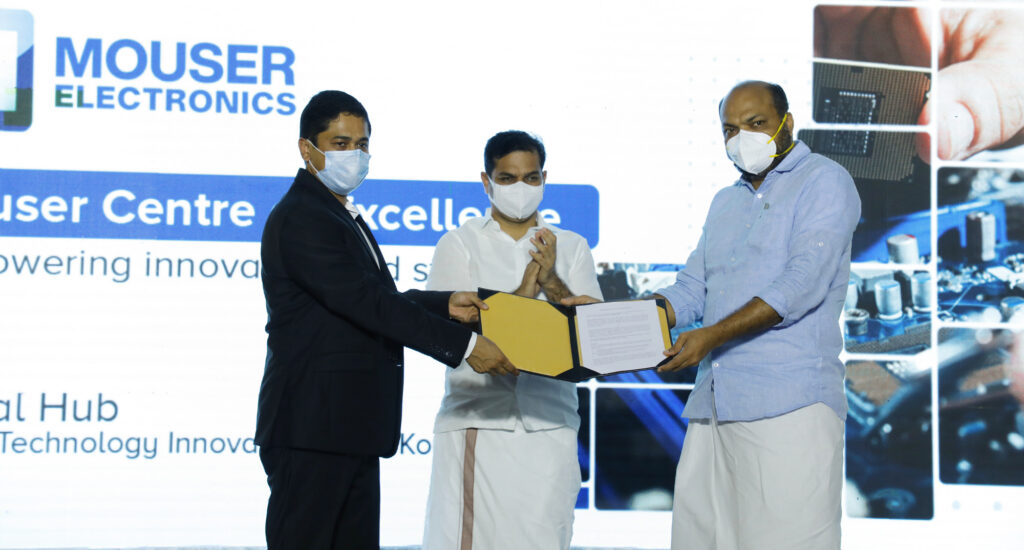
Minister for Law, Industries and Coir Shri P. Rajeeve, in his presidential address, said the government was determined to go ahead with its plans to encourage the state’s young entrepreneurs. “We are giving focus to the semiconductor sector and are in talks with companies in Belgium,” he pointed out.
Shri Hibi Eden, MP, felicitating the KSUM, called upon the government to open innovation-promoting academic courses in the state. Infosys Co-founder Shri Kris Gopalakrishnan said the coming three decades hold a brighter path for young entrepreneurs compared to the past 30 years.
Principal Secretary (Electronics & IT) Shri Biswanath Sinha, welcoming the gathering, said the government is charting a special scheme for startups that function outside the IT sector. “KSUM effectively charts the future of the youth in Kerala,” he added. Chief Secretary Dr V P Joy and KIIFB CEO Shri K M Abraham were present.
KSUM Chief Executive Officer Shri John M. Thomas proposed thanks.
The CoE at the Digital Hub aims to groom shelter-related ideas and innovations, and will function as a one-stop centre for all product-design and development activities for software and hardware components. These include all sectors and emerging technologies such as artificial intelligence, robotics, augmented reality/virtual reality, internet of things and natural language processing.
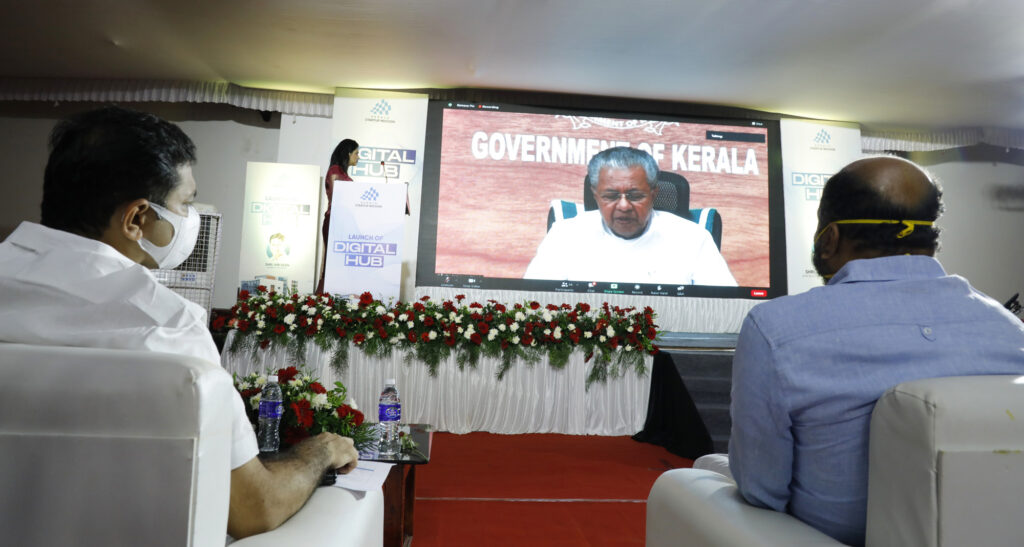
The Digital Hub comes at a time when Kerala is giving extra focus on building the end-to-end process from ideation stage to prototype stage of a product, capitalising on its unique combination of assets. The coastal state, with its logistical and maritime advantage, has a rich talent in engineering design, a Digital Fabrication Network, a Super Fablab and a hardware incubator named Maker Village, besides small-scale manufacturing clusters, industrial corridors and maker communities.
TIZ is being established in a 13.2-acre land at KINFRA Hitech Park in Kalamassery, envisioning a one-stop destination for technology innovation that encapsulates everything from the consolidation of the idea, to its incubation, acceleration and to mentor support to set up an enterprise and even a squadron of angel investors ready to invest in a bankable idea. The Zone has a total built-up area of 4 lakh sq ft. Currently its first phase is operational with two buildings: Integrated Startup Complex (ISC) and Biotechnology Incubation Centre, with an overall built-up area of 2.3 lakh sq ft.
KSUM, as the state’s 2006-founded nodal agency for entrepreneurship development and incubation activities, has been primarily designated to establish and operate the TIZ as a global innovation incubator hub for various technology sectors. The Zone comprises Incubators, Accelerators, built-up start-up modules, COEs, high-end fabrication labs, R&D lab facilities, office spaces and amphitheatre among other facilities.

